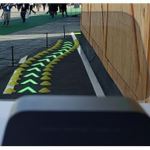HUDs Have Crucial Role in Future In-Car HMI Development, Finds Strategy Analytics
AR HUDs Could Provide Powerful Tool to Enhance Driver Safety & UX
BOSTON–(BUSINESS WIRE)–In a new report from the In-Vehicle UX (IVX) team at Strategy
Analytics, consumers in the US, Western
Europe, and China were surveyed regarding usage of and satisfaction with
their head-up
display (HUD). A small majority of owners worldwide use their
head-up display full-time rather than hiding it from view, though such
usage is markedly lower in China. Most consumers are satisfied with
various aspects of their head-up display, but visual appeal and ease of
adjustment elicited the most dissatisfaction. Despite their futuristic
appeal, the jury remains out on the practical usefulness of head-up
displays.
Key report findings include:
-
HUDs provide a way to display the status of the most relevant and
critical functions to the driver in a manner that minimizes
eyes-off-road-time (EORT) including but not limited to elements such
as speed, critical warning indicators, next turn information and
cruise control status information. -
Due to the nature of HUDs sitting within a driver’s forward field of
view (FFOV), display of more than seven pieces of information can be
perceived as cluttered, distracting or inhibiting EORT. As such, great
care must be taken to avoid superfluous or unnecessary information in
the HUD. -
But, as customizable digital instrument clusters (and HUDs) become
more common across model lines, designers and engineers will have new
“blank canvases” from which to build a driver-centric interface.
Derek Viita, Senior Analyst IVX and report author commented, “The
future of HUDs over the next 2 to 3 product cycles is exciting, as HUDs
will have a crucial role to play in future HMI development, and be
directly impacted by several future trends.”
Continued Viita, “Augmented reality (AR) HUDs for example, will
gradually move from CES
fantasy to on-market reality. When integrated well, AR can alert a
driver to hazards, and effortlessly inform passengers of last-mile
navigation information, providing a unique and powerful tool to enhance
the UX and safety of the driver. Moreover, as semi-automated driving
assistants spread across model lines, the HUD will also be an important
modality for hand-off and take-over warnings.”
Added Chris Schreiner, Director, Syndicated Research UXIP, “But
with all of the information augmented reality HUDs can provide, there
will be a fine line between alerting the driver and obscuring their
FFOV. When presenting such an alert in the HUD, designers will have the
challenge of alerting and bringing a driver “back into the loop,” while
not distracting them or degrading their situational awareness by
occluding their view.”
About Strategy Analytics
Strategy Analytics, Inc. provides the competitive edge with advisory
services, consulting and actionable market intelligence for emerging
technology, mobile and wireless, digital consumer and automotive
electronics companies. With offices in North America, Europe and Asia,
Strategy Analytics delivers insights for enterprise success. www.StrategyAnalytics.com.
About In-vehicle UX
Our In-vehicle User Experience (IVX) service investigates UX innovation
opportunities in the connected vehicle. By understanding the emerging
behaviors, needs, motivations, use cases, pain-points and “must-have”
experiences of lead adopters and future target consumers, IVX delivers a
roadmap to help you design the optimal experience. IVX forms part of the
User Experience Innovation Practice (UXIP) at Strategy Analytics.
Through both syndicated and proprietary user-centric research
capabilities, UXIP delivers strategic insights and analysis on how to
optimize the user experience of new and emerging technologies. Click here
for more information.
Contacts
US Contact: Derek Viita, +1 617 614 0772, [email protected]
European Contact: Diane O’Neill, +44(0) 1908 423 669, [email protected]


